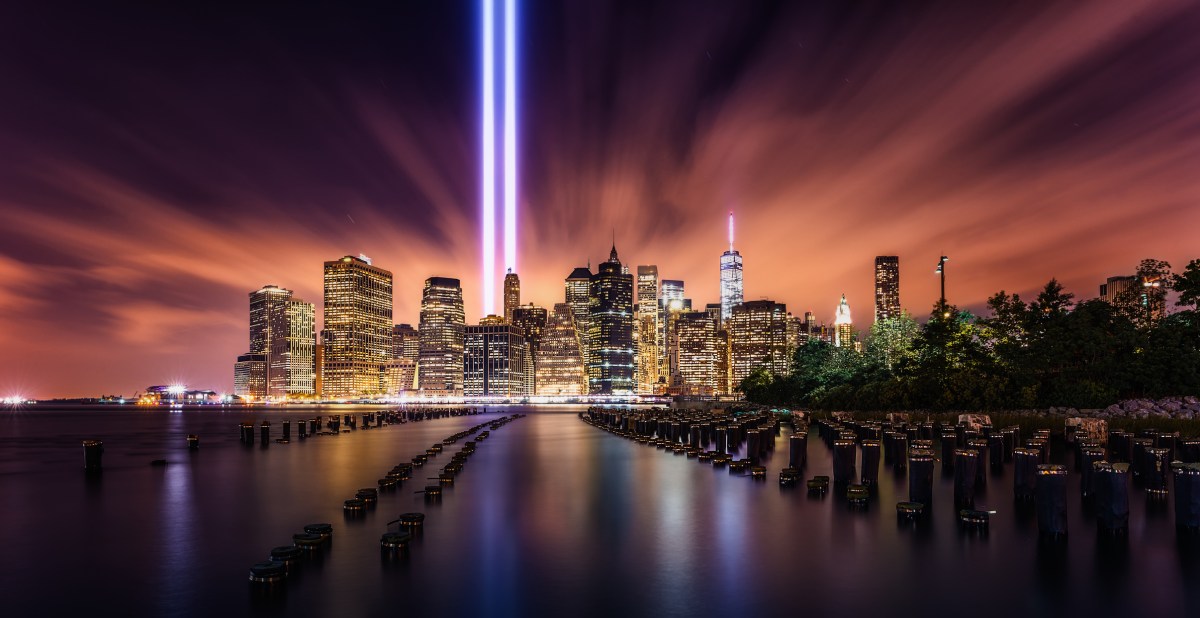When the elections roll around in November, there will be a new generation of voters who regard the events of September 11, 2001 as a history lesson. Which is reasonable—it’s now 17 years in the past so they were only infants at the time.
Even for those of us who were of age during the attacks, the memories may be very intense but a bit hazy. It’s easy to remember how you felt getting the news but harder to recall how the next days and weeks actually progressed.
Some heartbreaking, others just surreal, these are details about 9/11 that you likely haven’t thought about for a long time or may have never learned at all.
The Skies Were Empty. Four planes were involved in the 9/11 attacks. Of course, there was no way of knowing if more planes weren’t also part of the plan. It was necessary to keep aircraft out of the air, leading to the grounding of roughly 4,000 planes in U.S airspace, with many ordered to land mid-journey. Civilian air traffic was shut down for three days. Which triggered…
A Staggering Number of Stranded Travelers. The town of Gander in Newfoundland, Canada, for example, has a population of roughly 10,000 yet wound up having to host 7,000 passengers. My parents were among the stranded, albeit on the other side of North America. “On 9/11, we were actually in Denali National Park,” my mother recalls. They had taken a cruise and were supposed to fly back to the East Coast from Fairbanks, Alaska on September 12. Instead, their cruise line wound up keeping them at a hunting lodge that had been scheduled to shut down. Every morning, they gathered at 7 a.m. for an update and were told there was no update on when they’d go home. After about five days, they simply headed on their own to the airport. In a few hours they managed to get the last two seats on a flight to Seattle. (My mother remembers basically unpacking their luggage item by item before they could get through airport security.) Following a night in Seattle, my parents caught a flight to Cincinnati and from there got a connection to Philadelphia. Bizarrely, this last flight was closer to empty than full. “Every passenger pretty much had their own row,” my mom remembers. They finally got home with no desire to travel again for a long time.
Apparently, they weren’t the only ones because…
Airlines in General Took a Massive Hit. Whether out of fear of future attacks or just the dread of knowing what a hassle it had become to navigate airports, travelers began to reconsider air travel. Already reeling from the logistics of thousands of canceled flights, airlines also had to deal with approximately a 30 percent drop in demand. Yet while the aviation industry was badly shaken, the city that had taken such a brutal hit kept going.
Broadway Went Black for a Shockingly Brief Time. The Great White Way was again up and running by 9/13. Incredibly, this wasn’t early enough for some—New York City Mayor Rudy Giuliani wanted the curtains raised on September 12. In general, it was decided that the economic and psychological benefits outweighed the desire to mourn.
Speaking of Rudy…
New York City’s Mayor Was Experiencing an Unusual Living Situation. Even before 9/11, Rudy Giuliani was undergoing heavy personal turmoil. His second marriage was crumbling and he had moved out of Gracie Mansion. During the days after the attack, he was living with his friend Howard Koeppel and Howard’s life partner, Mark Hsiao. Koeppel would later recall that Hsiao made breakfast for the trio each morning and Giuliani always wanted help picking out ties. Sweetly, Giuliani promised to personally wed the duo if gay marriage were legalized.
When New York did legalize it, however, Giuliani declined. And while Giuliani inspired the nation and world after 9/11, eventually it was revealed he had a more complex legacy. In particular…
Some Pre-9/11 Decisions by the Giuliani Administration Had Tragic Consequences That Day. The 9/11 attack wasn’t the first assault on the World Trade Center. It experienced a truck bombing in 1993. Knowing it was a target, the choice to house the Emergency Command Center there was, at best, questionable and the NYPD strongly opposed it. The Center was, of course, rendered useless by the attacks. Giuliani—who had been in office since 1994—would also be heavily criticized by New York City firefighters for the radios that failed so frequently on 9/11. FactCheck.org examined their union’s accusation that “Rudy and his hand-picked fire commissioner took seven long years to replace the defective radios with new defective radios” and concluded: “That harsh judgment is accurate.”
Indeed, in general…
The Public Faces of 9/11 Had Unbelievable Highs… While George W. Bush had lost the popular vote in 2000, after 9/11 he saw his approval rate soar to a record 90 percent, leading his chief strategist Karl Rove to envision a permanent majority for Republicans. Rudy Giuliani was dubbed “America’s Mayor” by Oprah and knighted, among other honors. And Bernard Kerik, who had only joined the NYPD in 1986 but unexpectedly rose to police commissioner in 2000 after serving as Giuliani’s driver and bodyguard when he ran for mayor in 1993, was nominated to be Homeland Security secretary in 2004.
…and Brutal Falls. Kerik was the first to drop, withdrawing his name from consideration for Homeland Security ahead of the report of an impressive array of scandals, ranging from multiple simultaneous affairs to the revelation that while heading the NYC Corrections Department he accepted over $150,000 in gifts from a New Jersey construction firm with alleged organized crime ties. He would ultimately be charged with a variety of crimes and serve three years in prison. Giuliani made a shockingly unsuccessful run for the presidency in 2008, focusing almost exclusively on Florida only to finish third there and drop out. And Dubya suffered the strange humiliation of watching Donald Trump’s efforts to expel Bushes from the GOP. First, Trump defeated brother Jeb’s presidential run. Then he pummeled the family with frequent attacks on George W. and even on Bush Sr. Most humbling, fellow Republicans shrugged off the assaults as Trump took the Republican nomination and the White House. Trump golfed instead of attending the funeral of Barbara Bush, who remains the only woman to be married to a President and give birth to another.
9/11 was also the date of events that suddenly seemed rather trivial.
Jay-Z Had a Truly Bizarre (But Successful) Album Launch. Originally slotted for September 18, to beat bootlegging the release of Jay-Z’s new album was moved up a week so it came out on… yeah. The Blueprint still sold over 420,000 copies in its first week, hit #1 and went double platinum. Considered by most his masterpiece, it was named one of the five best albums of the 2000s by Rolling Stone and Pitchfork.
And for a bit more popular culture…
9/11 Has Inspired a Number of Movies You Likely Don’t Remember. Granted, there was one genuine blockbuster—Michael Moore’s Fahrenheit 9/11—though that documentary was arguably more about the Bush administration than the day itself. And United 93 was a critical success. But World Trade Center? (Oliver Stone directed it.) Reign Over Me? (It starred Adam Sandler in a dramatic role.) Extremely Loud & Incredibly Close? (It featured, er, a kid who competed on Jeopardy.) This tragedy may one day get its equivalent of Schindler’s List, but nearly two decades out the search continues.
Sadly, when 9/11 generates headlines today, it’s often for the most depressing of reasons.
Even 9/11 Victims Can’t Avoid Getting Sucked into Politics. Both 2010 and 2015 saw Republican senators block 9/11 health bills. In each case, the bill eventually passed, but not until there was heavy public lobbying by everyone from first responders to Jon Stewart. And 2018 saw a new controversy with a proposal to shift the World Trade Center Health Program from the National Institute of Occupational Safety and Health to the National Institutes of Health. Critics argue the move is unnecessary and will simply complicate victims’ efforts to get aid. And this matters deeply because…
The EPA Was Wrong About the Air at Ground Zero. In 2016, former head of the Environmental Protection Agency Christine Todd Whitman conceded that they should have never announced that the air around the site in New York was safe for breathing: “I’m very sorry that people are sick. I’m very sorry that people are dying and if the EPA and I in any way contributed to that, I’m sorry. We did the very best we could at the time with the knowledge we had.” Related…
The Number of 9/11 Victims Continues to Grow. A total of 2,977 people in New York City, Washington, DC and Pennsylvania were killed as a direct result of the 9/11 attacks. This is more than the number of people killed at Pearl Harbor. But the real total is higher. Over 2,000 deaths are attributed to illnesses linked to 9/11. And nearly 10,000 first responders and others who were near Ground Zero have cancer. The aftereffects of 9/11 will soon have claimed more lives than the actual day, a reminder that even if it’s no longer a national focus, it isn’t over.
This article appeared in an InsideHook newsletter. Sign up for free to get more on travel, wellness, style, drinking, and culture.

























